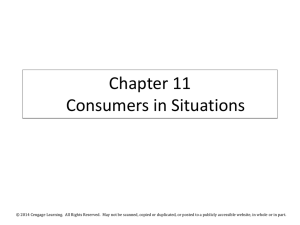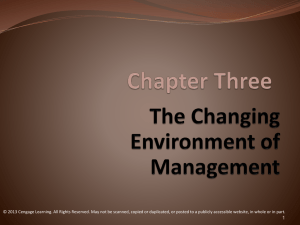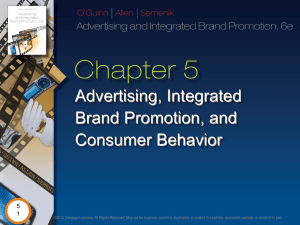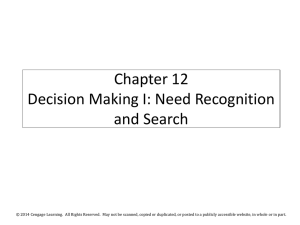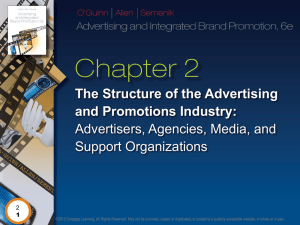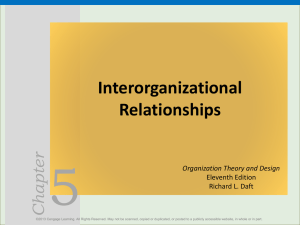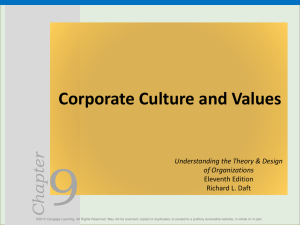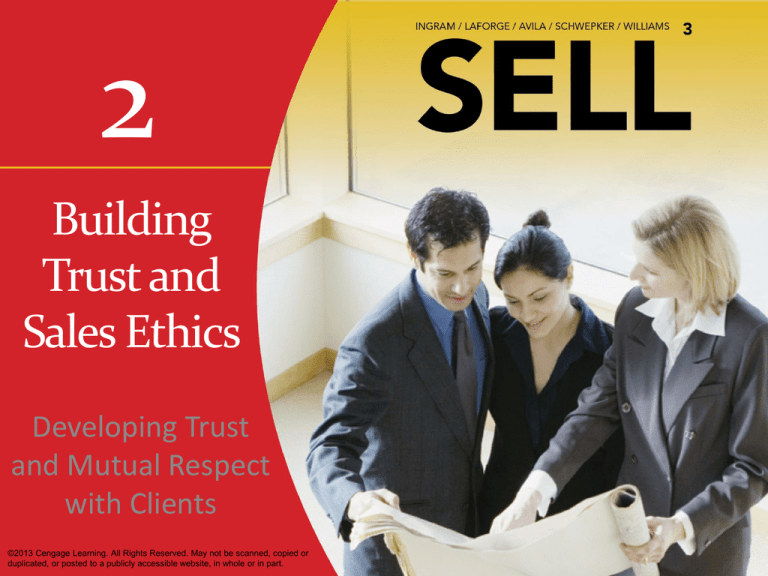
2
Building
Trust and
Sales Ethics
Developing Trust
and Mutual Respect
with Clients
©2013 Cengage Learning. All Rights Reserved. May not be scanned, copied or
duplicated, or posted to a publicly accessible website, in whole or in part.
Learning Objectives
L 1
Explain what trust is.
L 2
Explain why trust is important.
L 3
Understand how to earn trust.
L 4
Know how knowledge bases help build trust and
relationships.
L 5
Understand the importance of sales ethics.
©2013 Cengage Learning. All Rights Reserved. May not be scanned, copied or duplicated, or posted to a publicly accessible website, in whole or in part.
2
Key Thoughts
• Trust is crucial to developing successful relationships
with customers.
• Build trust by being competent, compatible, candid,
customer-oriented, and dependable.
• You must have the initiative and motivation to learn
about your company, your customers, and the markets
in which you and they compete.
• Professional salespeople, by
definition, must be ethical or they
are not professional.
©2013 Cengage Learning. All Rights Reserved. May not be scanned, copied or duplicated, or posted to a publicly accessible website, in whole or in part.
2
What is Trust?
©2013 Cengage Learning. All Rights Reserved. May not be scanned, copied or duplicated, or posted to a publicly accessible website, in whole or in part.
2
Why is Trust Important?
A fundamental competitive strategy of a growing
number of organizations is to build long-term
mutually beneficial relationships with their
customers. The ability of those
organizations’ salespeople to
earn their customers’ trust
is essential to the success
of that strategy.
©2013 Cengage Learning. All Rights Reserved. May not be scanned, copied or duplicated, or posted to a publicly accessible website, in whole or in part.
2
How to Earn Trust
Dependability
Customer
Orientation
Expertise
Candor
Trust
Compatibility
©2013 Cengage Learning. All Rights Reserved. May not be scanned, copied or duplicated, or posted to a publicly accessible website, in whole or in part.
2
Expertise
The ability, knowledge, and resources to
meet customer expectations.
Expertise must translate into observable
results and contribution for the buyer.
©2013 Cengage Learning. All Rights Reserved. May not be scanned, copied or duplicated, or posted to a publicly accessible website, in whole or in part.
2
Dependability
Predictability of a
person’s actions.
The salesperson must also
demonstrate an ability to
handle confidential
information.
©2013 Cengage Learning. All Rights Reserved. May not be scanned, copied or duplicated, or posted to a publicly accessible website, in whole or in part.
2
Candor
Honesty of the spoken word.
It means being upfront with
others, especially with
regard to issues/factors that
may impact those others.
It takes only one
misleading event to
lose all credibility.
©2013 Cengage Learning. All Rights Reserved. May not be scanned, copied or duplicated, or posted to a publicly accessible website, in whole or in part.
2
Ethical Dilemma
©2013 Cengage Learning. All Rights Reserved. May not be scanned, copied or duplicated, or posted to a publicly accessible website, in whole or in part.
2
Customer Orientation
The act of
salespeople placing
as much emphasis
on the customer’s
interests as their
own.
Salespeople with a customer
orientation advise rather
than “sell”.
©2013 Cengage Learning. All Rights Reserved. May not be scanned, copied or duplicated, or posted to a publicly accessible website, in whole or in part.
2
Compatibility
A salesperson’s
commonalities
with other
individuals.
Customers generally like to deal with
salespeople whom they can feel a bond.
©2013 Cengage Learning. All Rights Reserved. May not be scanned, copied or duplicated, or posted to a publicly accessible website, in whole or in part.
2
Readiness to Earn Trust
©2013 Cengage Learning. All Rights Reserved. May not be scanned, copied or duplicated, or posted to a publicly accessible website, in whole or in part.
2
Knowledge Bases Help Build
Trust and Relationships
Companies provide
extensive training
to prepare
salespeople for the
field.
©2013 Cengage Learning. All Rights Reserved. May not be scanned, copied or duplicated, or posted to a publicly accessible website, in whole or in part.
2
Training
©2013 Cengage Learning. All Rights Reserved. May not be scanned, copied or duplicated, or posted to a publicly accessible website, in whole or in part.
2
Industry Knowledge
Knowledge Need: the dynamics, structure,
culture, and forces that affect the industry or
industries in which they work.
Benefit: ability to 1) develop and execute
effective selling strategies, and 2) be viewed
as a market information resource.
©2013 Cengage Learning. All Rights Reserved. May not be scanned, copied or duplicated, or posted to a publicly accessible website, in whole or in part.
2
Company Knowledge
Knowledge Need: understand their
company’s culture, mission, goals, policies,
and procedures.
Benefit: ability to effectively and accurately
represent the company when interacting
(e.g., negotiating) with its prospective and
current customers.
©2013 Cengage Learning. All Rights Reserved. May not be scanned, copied or duplicated, or posted to a publicly accessible website, in whole or in part.
2
Product Knowledge
Knowledge Need: a thorough understanding
of their product offerings and the various
sources of value they provide
Benefit: be perceived (by the customer) as
experts and capable of accurately matching
solutions to the needs of the customer
©2013 Cengage Learning. All Rights Reserved. May not be scanned, copied or duplicated, or posted to a publicly accessible website, in whole or in part.
2
Service Knowledge
Knowledge Need: understand their company’s
service capabilities, including limitations, fees,
time-frames, and the value they add
Benefit: ability to match their company’s
service capabilities to the needs of their
customers
©2013 Cengage Learning. All Rights Reserved. May not be scanned, copied or duplicated, or posted to a publicly accessible website, in whole or in part.
2
Service Knowledge Areas
©2013 Cengage Learning. All Rights Reserved. May not be scanned, copied or duplicated, or posted to a publicly accessible website, in whole or in part.
2
Promotion and Price Knowledge
Knowledge Need: understand the details of,
and how to manage, promotional programs
and the pricing policies of their products
Benefit: ability to 1) facilitate their
customers’ participation in promotional
programs and 2) effectively negotiate terms
©2013 Cengage Learning. All Rights Reserved. May not be scanned, copied or duplicated, or posted to a publicly accessible website, in whole or in part.
2
Market and Customer Knowledge
Knowledge Needs: understand the markets
they serve and their customers, including
needs, personalities, and communication
styles.
Benefit: ability to 1) develop and implement
effective selling strategies, and 2) clearly
communicate relevant solutions.
©2013 Cengage Learning. All Rights Reserved. May not be scanned, copied or duplicated, or posted to a publicly accessible website, in whole or in part.
2
Competitor Knowledge
Knowledge Need: their competitors and
respective market offers and how they are
perceived in the market.
Benefit: to position their products against
those of their competitors’.
©2013 Cengage Learning. All Rights Reserved. May not be scanned, copied or duplicated, or posted to a publicly accessible website, in whole or in part.
2
Technology Knowledge
Knowledge Need: understand how utilize
sales technology hardware and software
(e.g., internet, CRM, laptops, smart phones)
Benefit: to leverage technology to me more
competitive . . . work smarter not harder
©2013 Cengage Learning. All Rights Reserved. May not be scanned, copied or duplicated, or posted to a publicly accessible website, in whole or in part.
2
Technology in the Sales Effort
©2013 Cengage Learning. All Rights Reserved. May not be scanned, copied or duplicated, or posted to a publicly accessible website, in whole or in part.
2
Ethical Dilemma
©2013 Cengage Learning. All Rights Reserved. May not be scanned, copied or duplicated, or posted to a publicly accessible website, in whole or in part.
2
Ethics
Ethics refers to right and wrong
conduct of individuals and
institutions of which they are a
part.
©2013 Cengage Learning. All Rights Reserved. May not be scanned, copied or duplicated, or posted to a publicly accessible website, in whole or in part.
2
2
Ethics
Ethics refers to right and wrong conduct of
individuals and institutions of which they are
a part.
Ethical Decisions
Clearly
Wrong
Ethical
Dilemma
Clearly
Right
©2013 Cengage Learning. All Rights Reserved. May not be scanned, copied or duplicated, or posted to a publicly accessible website, in whole or in part.
What is Ethics
• “…that behavior which is the ‘right’
thing to do, given the circumstances”
• Four principles:
– Honesty
– Integrity
– Fairness
– Concern for others
©2013 Cengage Learning. All Rights Reserved. May not be scanned, copied or duplicated, or posted to a publicly accessible website, in whole or in part.
2
Image of Salespeople
©2013 Cengage Learning. All Rights Reserved. May not be scanned, copied or duplicated, or posted to a publicly accessible website, in whole or in part.
2
Unethical Behavior
©2013 Cengage Learning. All Rights Reserved. May not be scanned, copied or duplicated, or posted to a publicly accessible website, in whole or in part.
2
Advice for Salespeople
©2013 Cengage Learning. All Rights Reserved. May not be scanned, copied or duplicated, or posted to a publicly accessible website, in whole or in part.
2
Non-Customer-Oriented Behavior
©2013 Cengage Learning. All Rights Reserved. May not be scanned, copied or duplicated, or posted to a publicly accessible website, in whole or in part.
2
Categories of Unethical Behavior
©2013 Cengage Learning. All Rights Reserved. May not be scanned, copied or duplicated, or posted to a publicly accessible website, in whole or in part.
2
Methods for Ethical Decision Making
• Teleology – morality of decision based on
the consequence (Consequentialism)
– Egoism (self-interest)
– Utilitarianism (greatest good for greatest
number)
• Deontology – morality of decision based
on intentions (Categorical Imperatives)
• Relativism – morality of decision based
on individual and past experience
• Absolutes – morality is the same for
everyone
©2013 Cengage Learning. All Rights Reserved. May not be scanned, copied or duplicated, or posted to a publicly accessible website, in whole or in part.
2
Five Common Ethical Traps
•
•
•
•
•
The False Necessity trap
The Doctrine-of-relative-filth trap
The Rationalization trap
The Self-deception trap
The Ends-justify-the-means trap
©2013 Cengage Learning. All Rights Reserved. May not be scanned, copied or duplicated, or posted to a publicly accessible website, in whole or in part.
2
Doing the right thing!
• Is the action you are considering legal?
• How would you see the problem if you
were on the opposite side?
• What are alternate solutions?
• Can you discuss the problem with
someone whose advice you can trust?
• How would you feel if your family,
friends, employer, or coworkers learned
of your actions?
©2013 Cengage Learning. All Rights Reserved. May not be scanned, copied or duplicated, or posted to a publicly accessible website, in whole or in part.
2


